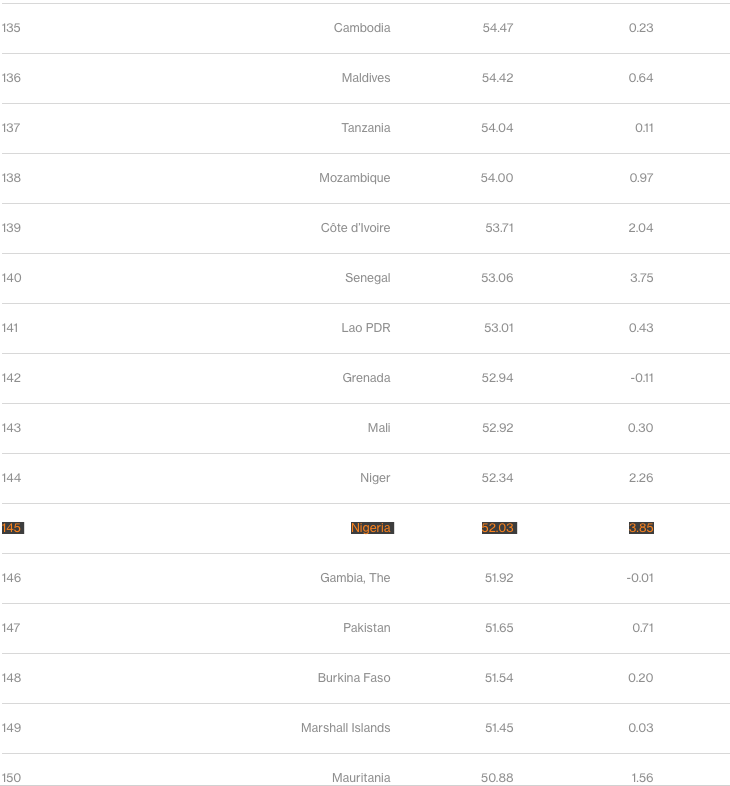On back of reforms, Nigeria leaps 24 places to 145 in World Bank’s Ease of Doing Business rankings
October 31, 20171.9K views0 comments
Nigeria climbs in World Bank’s Doing Business rankings, thus emerging along with India and Zambia as biggest winners in the World Bank’s latest Doing Business rankings, with the institution labeling Nigeria as one the top 10 most improved economies in the world.
“Brunei Darussalam, Thailand, Malawi, Kosovo, India, Uzbekistan, Zambia, Nigeria, Djibouti and El Salvador were the most improved economies in 2016/17 in areas tracked by Doing Business,” the World Bank report stated, adding that together, these 10 top improvers implemented 53 regulatory reforms making it easier to do business.
The World Bank claims that economies in all regions are implementing reforms easing the process of doing business, but Europe and Central Asia continues to be the region with the highest share of economies implementing at least one reform—76 percent of economies in the region have implemented at least one business regulatory reform, followed by South Asia and Sub-Saharan Africa.
The World Bank Doing Business project provides objective measures of business regulations and their enforcement across 190 economies.
Read Also:
- Allianz warns! Stability, business continuity risks, political violence…
- Nigeria makes medical milestone with world’s first 5-in-1 meningitis vaccine
- Business should not stop looking for new grounds
- Zenith Bank soars to new heights on triple-digit profit explosion
- Nigeria's oil falters as Libya claims Africa's top spot
The report features four case studies in the areas of starting a business, dealing with construction permits, registering property and resolving insolvency, as well as an annex on labor market regulation.
The World Bank highlighted five reforms making it easier to do business in Kano and Lagos, the two cities covered by the report in Nigeria over the course of last year: They are Starting a Business, Dealing with Construction Permits, Registering Property, Getting Credit and Paying Taxes.
In the area of company registration, the Corporate Affairs Commission has moved to offer online registration and introduced new features such as electronic stamping of registration documents. Thus, entrepreneurs have been able to register their businesses much faster, within 24-48 hours, thereby saving cost and time.
Getting construction permits and registering property in both Lagos and Kano States have become more transparent and easier for businesses with the online publication of all relevant regulations, fee schedules and pre-application requirements online. Getting access to credit is now easier and Nigeria is placed 6th in the world on this indicator. The Government recorded a significant success by collaborating with the National Assembly to pass two new Acts, the Secured Transactions in Movable Assets Act 2017 and the Credit Reporting Act 2017, thereby strengthening the legal framework for access to credit for SMEs across the country – an important requirement for the success of SMEs. Finally, it has become easier to pay taxes in Nigeria because taxpayers can file tax returns at the nearest Federal Inland Revenue Service (FIRS) office, and electronic payment and filing are gradually gaining acceptance.
Nigeria to raise monthly VAT collection to N100bn, collects N797.51bn year to date
In the ranking New Zealand occupied the first position followed by Singapore (2), Denmark (3), USA (6) and UK (7).
On the African continent, Nigeria ranking 145 is poor when compared to peers. Rwanda topped all African countries in the ranking, occupying the 41st position, followed by Kenya (80), Botswana (81), South Africa (82) and Zambia (85).
Other African countries on the ranking above Nigeria include Lesotho (104), Namibia (106) and Ghana (120).
The current administration, following previous poor performances in the ranking vowed to remove red-tape, eliminate bureaucratic bottlenecks, procedural delays, graft and make Nigeria an attractive investment destination for serious entities.
It specifically set a target of moving from 169 into 149 in 2017-18 and leapfrogging into the top 100 in the Doing Business survey by 2030.
To deliver on this, it set up a 60-day national action plan covering key priority areas under what is known as The Presidential Enabling Business Environment Council (PEBEC).
This action plan was closely followed by the release of the scorecard on the 60-day action plan to measure the progress and achievements. The report highlighted 31 completed reforms across eight priority indicators. The scorecard specifically covered the success achieved within the 60 days period from February 21, 2017 to April 21, 2017. Ease of Doing Business in Nigeria: PEBEC Completes 31 Reforms in 60 Days.
“I welcome Nigeria’s improved performance. We are one of the top ten reforming economies in the world in 2017. After a decade-long decline in Nigeria’s rankings, last year the Government recorded a modest increase.
“President set us an ambitious target of moving up twenty places in the rankings – I am delighted that we have exceeded his goal. Improving the business environment is at the heart of the Buhari Administration’s reform agenda. We are reinforcing our economic turnaround by a vigorous and active implementation of the Economic Recovery and Growth Plan (ERGP) so businesses operating in Nigeria can thrive and be competitive globally,” Yemi Osinbajo, Nigeria’s vice president said reacting to the ranking.
He added: “For the first time, coordinated efforts across various levels of governments have been undertaken to make it easier to do business in Nigeria. I commend all stakeholders who worked with us to achieve this significant result, particularly the National Assembly, Lagos and Kano State Governments, and the private sector.”
He said government focus remains firmly on ensuring that SMEs operating in Nigeria find it easier to do business.
